
22 minute read
Member Church News
AFRICA Uniting Presbyterian Church in Southern Africa (UPCSA) issues statement on femicide and gender-based violence
Uniting Presbyterian Church in Southern Africa (UPCSA) issued a statement following the deaths of two young casualties of femicide and gender-based violence (GBV) in early June. Naledi Phangindawo, 26, an entrepreneur and a mother of three children was killed while attending a cultural function in KwaNonqaba, Mossel Bay. Tshegofatso Pule, 28, was eight months pregnant when she was found stabbed and hanged from a tree in Roodepoort.
These were reported GBV cases which ended in death, and there could be many cases going unreported, the statement noted. Calling out “persistent, abhorrent acts of femicide and gender-based violence”, UPCSA General Secretary Rev Lungile Mpetsheni implored presbyteries, congregations and fellowships, to act against GBV and empower all to stand against it, especially since such violence was expected to escalate during the lockdown.
To promote the sanctity of life and espouse life-a rming theologies and practices, Rev Mpetsheni also reiterated the call for Gender Desks to be established in congregations.
All Africa Conference of Churches (AACC) encourages churches to mark World Day against Tra cking in Persons
The World Day against Tra cking in Persons is commemorated on 30 July every year. This year, the COVID-19 pandemic has increased the vulnerability of many to human tra cking as people have lost jobs, or have their income-generating activities slowing down or halted.
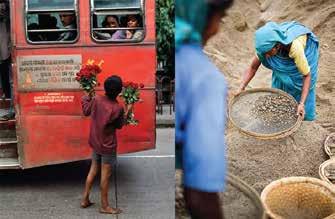
Despite decades of independence, Africa still struggles to provide its people opportunities for subsistence. As a result, tra ckers take advantage of their desperation for survival, “luring them into slave-like work without proper or no remuneration in their home country or in other countries”.
In a statement, AACC General Secretary Rev Dr Fidon Mwombeki called on church leadership to “advocate with governments to be responsible by providing employment opportunities and enabling environment for the increasing population of youth to be gainfully employed”, to reduce their quests to leave their countries through unsafe means.
He also urged churches to caution believers “to follow due processes of migration or travels to (their) country of choice” if they wish to explore opportunities overseas. Churches were encouraged to use special prayers and presentations to increase awareness of the dangers and crime of human tra cking on 26 July or 2 August.
All Africa Conference of Churches (AACC) urges churches to address unsustainable population growth
The All African Conference of Churches (AACC) has called upon African churches to tackle the issue of unsustainable population growth and challenges associated with population explosion in the Africa continent. A high-level webinar consultation on 9 July had convened ecumenical and ecclesial leaders, among others, who a rmed that churches in Africa must look into this issue as it is “central to the dignity of Africans”.

In a statement on World Population Day, AACC General Secretary Rev Dr Fidon Mwombeki declared that “unless the Church starts addressing the issue of population growth urgently and adequately, it will not be able to o er transformative accompaniment to its followers.”
Overpopulation has brought about mounting challenges of underdevelopment such as poor access to social services such as health and education; congested classrooms, and increasing number of street children, he said. In addition, Africa is not bene tting from a demographic dividend as the youths are too young to be working, coupled with the lack of job opportunities from worsening economic conditions, leaving many families destitute.
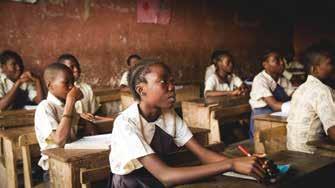
Rev Dr Mwombeki asked for the Church to “start debunking prevalent cultural and spiritual beliefs about multiplying and lling the earth”, emphasising “responsible parenthood” as part of Christians’ spiritual responsibility, even as he acknowledged that this would be di cult owing to “established theological teachings”.
“The AACC will work with churches in Africa by assisting them to develop an advocacy framework for engaging governments, as well as theological tools for inter-religious dialogue and engagement around sustainable population for sustainable development,” he added.
Presbyterian Church of Korea (PCK) joins Ecumenical Peace Message for 70 th anniversary of Korean War
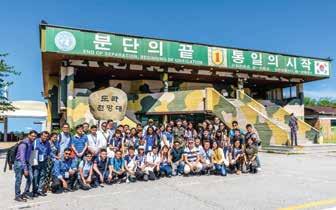
Presbyterian Church of Korea
(PCK) were among the churches and councils of churches worldwide endorsing a Joint Ecumenical Message marking the 70th anniversary of the start of the Korean War, delivered during a live-streamed event on 22 June. The statement called for an immediate formal declaration to the end of the Korean War, and swift steps towards adoption of a peace treaty to replace the 1953 Armistice Agreement, as a starting point for progress towards peace on the Korean Peninsula. Ful lment of these, the statement noted, is expected to contribute to “enhancing conditions for pragmatic dialogue and negotiation on current realities on the Peninsula”.
The statement was also an appeal to: • Suspend and cancel any further military exercises in the region; • Resume dialogue between the North and South Korea, and between the USA and North Korea, with the encouragement and support of other states who were involved in the Korean War; • normalisation of diplomatic relations between North Korea and the USA.
This year, the National Council of Churches in Korea (NCCK) and World Council of Churches had been observing “We Pray, Peace Now, End the War”, a global prayer campaign for a formal end to the Korean War and the replacement of the 1953 Armistice Agreement with a peace treaty.
Declaration for Korea Peace Agreement launched
A Declaration for the People’s Korea Peace Agreement was launched on 23 July at a global Zoom convocation. Initiated by the National Council of Churches in Korea (NCCK) and civil organisations, the convention aimed to solidify the ecumenical bond in supporting a peace agreement which replaces the Armistice Agreement.
Churches and civil society in Korea had drafted this Peace Agreement for the past six months, and it includes an end-of-war declaration, withdrawal of foreign troops and denuclearisation of the Korean Peninsula based on improved relations and trust between both parties.

The treaty should be signed in accordance with existing declarations, and contracting parties are to support peace and reuni cation e orts
between North and South Korea, and to implement a step-by-step realisation of a peace regime. Building a peace regime will extend beyond the two Koreas, and help to promote security for nearby countries, the US, and Russia, and align with UN’s purpose for world peace.
Another key outcome of the convention was that the suggestion that women should be included in every peace negotiation was accepted.
Presbyterian Church in Taiwan (PCT) elects rst female Moderator
PCT elected its rst female Moderator, Rev Abus Takisvilainan, during its 65th General Assembly on 17 June. This was a nod to gender justice, and a rmation and advocacy of the gifts, humanity and right of places of all persons in society, and where women are equipped and availed of equal opportunities for leadership roles in both church and society. Rev Takisvilainan has been a PCT pastor for 27 years, and hails from the Bunun indigenous group. She paid tribute to female pastors and Christians in PCT who have served faithfully and silently over the past 155 years, and thanked the church for its intercessory prayers.

Rev Takisvilainan added that this glory and position was not for her alone, and also for PCT to implement the value of gender justice in the land of Taiwan, to allow for both genders to work together in ful lling God’s mission. She also stressed that PCT’s best and sole leader is the Lord Jesus Christ, who will take them forward and shape systems for future generations of leaders to forge ahead.
Hong Kong Council of the Church of Christ in China (HKCCCC) General Secretary expresses solidarity amidst Hong Kong’s challenges
Anti-extradition con icts since June 2019, coupled with the COVID-19 epidemic, have beset most sectors of the Hong Kong community, bringing about challenges ranging from health, livelihood, unemployment, the slowing economy to political controversies.

In a recent letter to the churches, Hong Kong Council of the Church of Christ in China (HKCCCC) Rev Dr So Eric acknowledged that “while many people are struggling with the impact of this predicament, some Christian organisations which receive government’s subvention are relatedly stable.” Most of their services can operate as usual without closures, wage cuts and or retrenchment. However, Rev Dr So reminded them of their “signi cant responsibility” to discern how to journey alongside the people of Hong Kong, going beyond being “service providers” to servants of God’s love during this di cult period of time.
He voiced his belief that when Hong Kong appears engulfed in pessimism and helplessness, it can be strengthened by God’s faith, hope and love to seek a way out. Biblical teachings can inspire them to persevere when the outlook is grim; imbue them with hope to strive for their ideals, and empower them to be transformed from self-centeredness to mutual care.
He concluded with an invitation “to all the Hong Kong Christians to a rm the spirit of the Christian emblem of a vessel with the cross of Jesus encountering a restless sea” to be reminded of the faith, hope and love we have to walk together with the Hong Kong people towards a bright future.”
SOUTH ASIA Church of Bangladesh (COB) resumes church services, continues support for those in need
The Barishal Diocese of Church of Bangladesh (COB) has informed its churches to resume services in smaller numbers, abiding by guidelines from the government. Through the support of the COB Synod and organisations such as YWAM, they supported 706 families in poverty, as well as a few families in Sundali, a new COB parish. Neighbouring
communities continued to receive help from the COB community health and nutrition programme, with supporting pregnant women being the focus in the month of June.

The diocese also celebrated World Environment Day on 5 June, where church members cleaned church campuses and local communities, and all clergies preached about creation care, clean environment, and a pollution-free world.
COB and the Anglican Diocese of Singapore also collaborated on “My Dorm Our Home”, a media project to build social cohesion among migrant workers in Singapore, and to strengthen their communal and social-emotional resilience during the COVID-19 period and beyond. COB led the work with a local production company to adapt existing programmes or develop new content such as personal skill development, English lessons, music and art to facilitate group interactions, and the content was made accessible through a mobile app.

Besides providing curated online programmes in three languages, it was also a platform for Singaporeans to share messages of encouragement and appreciation, and to hear each other’s stories.
Church of North India (CNI) installs its seventh General Secretary
CNI installed Rev Shailesh Dennis Lall, an ordained minister of the Delhi Diocese as the seventh General Secretary of the CNI Synod in a solemn service on 2 July. The service in Bhavan Chapel was conducted by CNI Moderator Most Rev Dr P.C Singh, and viewed by many CNI members and others worldwide on Zoom. Prior to this appointment, Rev Lall was Secretary of the Delhi Diocese and Presbyter in Charge of St. Martin’s Church, Delhi Cantonment, having served for 22 years in both rural and urban settings.
Taking up the mantle of leadership, Rev Lall spoke about how the church had worked towards socioeconomic justice and development, pioneered in health and education, and provided spiritual nurture in the country as part of its witness and service.
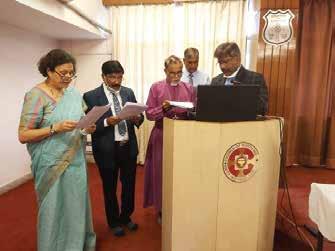
He considered promoting mental health and wellbeing as another aspect of church ministry that should be prioritised. During the pandemic, psychological challenges were on the rise and likely to continue post-pandemic, and the Church has the responsibility and potential for psychological empowerment for all ages at all levels, he said.
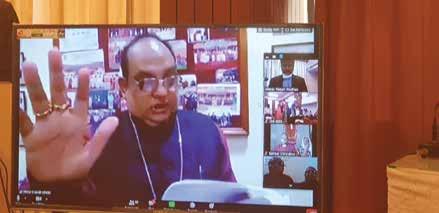
Rev Lall also expressed his wish to contribute towards meaningful engagement with ecumenical partners locally and globally, as CNI “has preferential commitment to be a leading light in ecumenical initiatives”.
Church of South India (CSI) calls for justice for victims of police brutality
Church of South India (CSI) General Secretary Adv. Fernandas Rathina Raja, among others, has called for action to be taken against police personnel involved in the alleged custodial murder of Mr Jayaraj and Mr Fenix - members of the Thoothukudi-Nazareth Diocese of the CSI - at Sathankulam, Thoothukudi in Tamil Nadu.
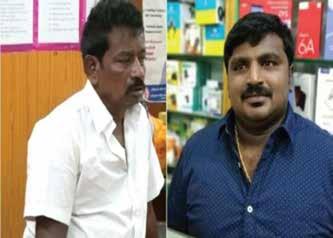
The father and son had been arrested for allegedly keeping their store open past permitted
opening hours during the COVID-19 lockdown, and they died two days after being released from police custody. Their relatives claimed that both of them were subjected to brutal torture. As the gruesome details emerged, the case sparked outrage on and o social media, and gained national attention.

In an open letter to the Chief Minister of the State and The Vice-Chairperson of the National Commission for Minorities, Adv. Fernandas pointed out that the police o cers who had used excessive force failed to follow legal guidelines and procedures, and he also drew attention to lapses by the Duty Doctor and Honourable Magistrate.
Police violence is said to be widespread and routine in India. According to a recent report, 1,700 people died in custody in India last year, and the police are rarely held accountable.
The CSI General Secretary stated in his letter that the CSI, along with the general public, are looking for intervention from the Chief Minister and the Minority Commission Chairperson in this case, and to “take stringent measures so that such brutal incidents does not take place in future.”
PACIFIC Paci c Conference of Churches (PCC) and UN Women sign deal to protect women and children
UN Women and the Paci c Conference of Churches (PCC) have inked a partnership deal to address the regional epidemic of gender-based violence. The project comprises a regional mapping of faith-based responses to Violence Against Women and Children, gender equality and child protection.
Speaking at the signing ceremony, PCC Moderator Deaconess Tamalesi Makutu said that under the partnership, the regional “Break the Silence Sunday Campaign” would help churches to engage regional and national leadership on the issue of violence against women and girls and to deliver strong messages to faith communities on the necessity of education, attention and response to this issue.
Launched as the “Just and Safe Paci c Communities of Women and Men” as part of the PCC’s 2020-2024 Strategic Plan, the collaboration also includes developing and implementing a Safe Church Policies and Codes of Conduct in member churches.

The partnership is signi cant as it recognises the importance of faith communities in the Paci c region “as partners in a common vision of safe and peaceful communities and homes” and “not just as target audiences of secular programmes on addressing Gender Based Violence”, she added.
“There will also be a speci c focus on increasing the participation and access of women in Church leadership and theology and on the role of Church Leaders as advocates,” she a rmed.
People at the heart of national budgets

On the eve of the announcement of Fiji’s 2020-2021 Budget, PCC urged Paci c Island countries to ensure that they focus on putting their people in the centre of any national budget. PCC General Secretary Rev James Bhagwan said in a statement that the right to water, health services and education is a fundamental right of citizens that should be addressed in a budget, and not as a privilege attached to votes.
“Roads and electricity must be provided under the budget in order to open up the most viable economic opportunities in agriculture, sheries and for Small and Medium enterprises, not as favours to political allies,” he continued.
Even though the impact of COVID-19 has placed severe challenges on governments, the people have a right to be consulted on the budget and how it will a ect them, including a just wage and representation by unions. He drew attention to the arbitrary dismissal of civil servants and unjust treatment of hotel and Fiji Airways sta as examples, and called on Paci c governments to “have the courage to speak of an economy of abundance at a time when the scarcity model is the dominant narrative.”
Papuan churches denounce state-sanctioned racism
The Papua Church Council has criticised the Indonesian government for institutionalised racism in handling West Papua’s 59-year struggle for self-determination, highlighting Jakarta's handling of protests in Surabaya last August. After an Indonesian ag was damaged, Papuan students were subsequently attacked by military o cers and nationalist militia, who taunted Papuans with racist slurs, and called them “animals”.
Papuan activist during a rally in Jakarta. Photo by AP.
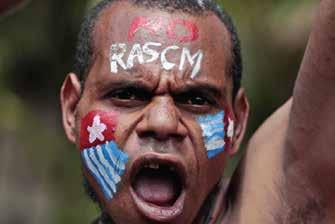
Papua is home to Grasberg, one of the largest gold mines, a natural gas eld, and several other natural resources. It had declared its independence in the early 1960s, but was incorporated back into Indonesia following a controversial referendum.
In a letter to the President Joko Widodo, Papuan church leaders said racism and inequality had "grown and become entrenched" after the Special Autonomy Act 21 of 2002 was implemented instead of granting them self-determination. The council appealed to the government to look into four critical issues - the history and political status of the integration of Papua into Indonesia; state violence and gross violations of human rights; discrimination and marginalisation of indigenous Papuans in their own land; and development failures including education, health, and the economy of the Papuan people.
Hundreds of indigenous people protested on the streets to call for justice for a father and son shot dead in Nduga district by Indonesian soldiers on July 18.
Resources for this year’s Season of Creation are now available
The global reach of COVID-19 revealed our shared human nature and inter-connectivity of our economies, political structures, healthcare systems, food chain production, energy and transportation systems. Thus, it is apt that this year’s theme for the Season of Creation is “Jubilee for the Earth”, as we consider how a respite for the Earth is intertwined with ecological, economic, social and political ways of living. Observed from September 1 to October 4, the Season of Creation is an annual celebration of prayer and action embraced by the wider ecumenical community to protect and care for our common home. This jointly-produced Celebration Guide provides resources for Christians worldwide to pray, re ect, and respond with bold action as stewards of God’s creation and includes liturgy for an eco-themed prayer service. The guide also includes ideas for advocacy to encourage sustainable living on an individual and institutional level, and organising sustainability events in communities, be it cleaning local waterways, or tree planting.

For more information and to download the celebration guide, visit https://seasonofcreation.org/
EUROPE Research on social and religious impact of pioneering spots in the Protestant Church of the Netherlands (PKN) published
Maarten Atsma of the Protestant Church of the Netherlands (PKN) recently spearheaded a research project “Pioneering: State of A airs”, focusing on the impact of pioneering on social cohesion and religious development. education, attention and response to this issue.
Shortly after PKN was established in 2004, it reached out to groups of people who do not feel connected to the church or to the Christian faith.
The rst pioneering spots emerged, with the support of Protestant congregations which bore the hope that the spots would contribute to church renewal as a whole. As of early 2020, the number of pioneering spots which have started or are in preparation have increased.
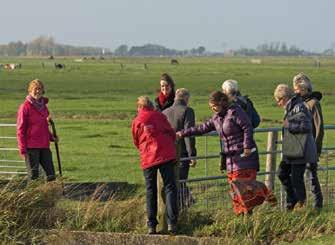
The goal of pioneering spots is to be developed into self-supporting congregations, and this project’s researchers spoke to people from pioneering spots to understand what pioneering means concretely in people’s lives. Most of the respondents have had to deal with personal crises, and these turning points played a role in their encounter with the pioneering spot, which functioned as a safety net for people who were socially or psychologically isolated in one way or another.
Majority of those surveyed had some form of Christian background, and around half said that their faith has changed after their involvement with the pioneering spot. This deepening and growth of personal faith was mostly attributed to the contrast to regular congregations, as well as the interactive methods used to engage participants to actively make sense of religion.
The conclusions of the research were that pioneering spots met the goal of reaching churchless people and non-practising members of the church; it is di cult to attract participants who have not encountered the Christian tradition at some point in their lives; and pioneering spots are important to the participants’ sense of social belonging and religious development with new and deeper relations formed.
Reopening of churches in Wales
The Welsh government and Cytun (Churches Together in Wales) jointly chaired an online Question and Answer session for faith communities on 16 July, to provide them with the opportunity to raise questions about the process of re-opening places of worship as COVID-19 restrictions would relaxing over the coming weeks. The reopening includes charities, and businesses, with a risk assessment to be carried out.
Union of Welsh Independents (UWI) is closely following the guidelines, which stipulate that “faith leaders can gradually resume services when they are ready to do so safely”, and outdoor gatherings of up to 30 people is permitted when organised and supervised by a responsible person.
United Reformed Church (URC) joins call for UK government to help deter West Bank annexation
URC statement west bank annexation.

Church leaders from the United Reformed Church (URC), and several other major Christian denominations have called on the UK government to help deter annexation of the West Bank, which was planned to begin on 1 July.
In the statement, they stood alongside the Holy Land’s Christian leaders, who have warned that the Israeli plan to annex part of the West Bank would mean losing “any remaining hope for the success of the peace process”.
Banksy image by thenational.ae
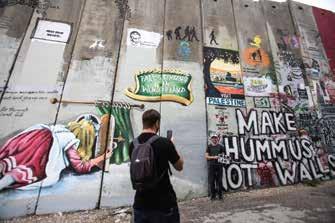
“All our Churches are committed to promoting justice and peace for everyone who calls the Holy Land their home. If annexation proceeds, it would gravely undermine international law with serious consequences for the common good of our global society.
“The UK government should do everything in its power to deter annexation. Only a robust
response, working alongside others in the international community, can help to prevent this tragedy.
The annexation has since been delayed, as one of the terms of a landmark peace deal between Israel and United Arab Emirates (UAE) in August. This would be Israel’s rst formal relationship with a Gulf state and its third with any Arab country.
United Reformed Church (URC) produces a guide for churches navigating digital space
What does being and doing church look like in our “new normal”? United Reformed Church (URC) has produced and shared a “Roadmap to Digital Discipleship” booklet to help churches consider their shared journey of discipleship in the digital realm.

The pandemic lockdown prompted many churches to create or build on an online presence, creating space for and incorporating essential elements of the discipleship journey - fellowship, inclusion and connection through technology. The lockdown also showed us a “two-tier church”: members who can physically attend church and activities, and those unable to do so due to ill health. For churches investing in virtual communities, URC’s booklet provides preliminary questions to help them to think through practical issues such as equipment, licenses and online platforms.
Congregational Federation (CF) among churches looking into racial justice
Congregational Federation (CF) and United Reformed Church are members of Churches Together in England (CTE), whose presidents have issued a statement exhorting churches to embark on the journey of racial justice, with self-re ection and concrete action within their churches and in society. Having listened to experiences of racism including micro aggression in the society, they recognised the racism that blights churches, and expressed their commitment to action to e ect real change. One example of ensuring fair practices is scrutinising and avoiding potential discrimination in making church appointments, whether it is done consciously or unconsciously.
Concerned about the relationship between the black community and the criminal justice system, the Presidents said that they will be facilitating conversations between young black people and senior member of police service, as well as engaging the Home O ce and Ministry of Justice. At the same time, they encouraged churches to “build trust and improve accountability between black communities, the police, civic bodies and wider community group”, and for church leaders to bring about “more inclusive ecumenical leadership” by reaching out to their black colleagues absent from their ranks. In doing so, it is hoped that spaces will be created for authority gures to listen to powerful testimonies of young people of colour as a step towards social cohesion.
CARIBBEAN The United Church in Jamaica and the Cayman Islands (UCJCI) organises “COVID-19: Then & Now” public forum
UCJCI’s Cayman Islands
Regional Mission Council
(CIRMC) recently organised a pre-recorded online public forum on the topic “COVID-19: Then & Now”. The guest panelists o ered insights into the impact of the crisis, sharing their expertise from the perspectives of theology and ethics, psychology and economy and nance. It aims to allow their congregations and fellowships to bene t from the solutions o ered on re-framing and seizing opportunities that may be available in the midst of the crisis of the pandemic.
COVID-19 First Responders Honoured
An appreciation service was held by a congregation of The United Church in Jamaica and the Cayman Islands, Webster Memorial, to a rm and express gratitude to rst responders to









